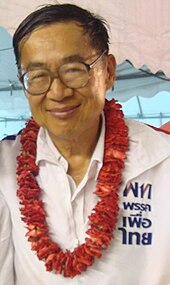Weng Tojirakarn
Weng Tojirakarn ( Thai เหวง โต จิ รา การ , RTGS : Weng Tochirakan, pronunciation: [ wěːŋ toːt͡ɕìʔraːkaːn ]; * April 1, 1951 ) is a Thai doctor and politician. He was a leader of the National Democratic Alliance against Dictatorship ( United Front for Democracy Against Dictatorship , UDD; colloquially "Red Shirts") and from 2011 to 2014 a member of parliament for the Pheu-Thai party .
Life
Youth and Democracy Movement
Weng Tochirakarn was born into a family of poor Chinese immigrants . Because of his talent, he received a scholarship to the renowned Triam Udom School. He then studied medicine at Mahidol University and was chairman of the university's student council. He was a follower of the Buddhist monk Buddhadasa Bhikkhu and believes that Buddhadasa's teachings prompted him to become politically and socially involved.
In 1973 he took part in the protests that led to the temporary end of military rule. He headed the progressive student organization Medical Students Center of Thailand . In 1976 he took part in the student protests against the return of the disempowered dictator Field Marshal Thanom Kittikachorn , which triggered the massacre at Thammasat University and the renewed takeover by the military. Like other radical intellectuals, Weng and his wife, microbiologist Thida Thavornseth , joined the banned Communist Party of Thailand (KPT) and fled to the mountains. There Weng was part of the KPT's medical unit that treated wounded comrades. After six years underground, he returned to a civil life in Bangkok due to an amnesty for former KPT fighters.
In 1992 he joined the protests against the military-installed government of Suchinda Kraprayoon , which went down in history as " Black May ". He was a co-founder of the Alliance for Democracy .
Beginnings in politics
Weng rejected the policies of Prime Minister Thaksin Shinawatra . He was particularly critical of the "bespoke" law that allowed Thaksin and his family to acquire billions in their Shin Corp. to sell to investors from Singapore . He joined the civil movement against Thaksin alongside Chamlong Srimuang , who had been the spokesman for the democracy movement as early as 1992. From this, the People's Alliance for Democracy (PAD), the so-called “yellow shirts”, developed.
However, Weng alienated himself from the demands of his political friends. He finally broke with the PAD when, in March 2006, they demanded a Prime Minister appointed by the King, bypassing Parliament's right to propose, (which the King has since refused). Weng saw such demands as undemocratic and accused some “yellow shirts” of behaving “like neo-Nazis”. After the coup in September 2006 , which ousted Thaksin, and the establishment of a military-backed government, Weng moved closer to the opposite political camp, the Thaksin-friendly "red shirts".
"Red shirt" and member of parliament
In 2007 he joined the Democratic Alliance against Dictatorship (DAAD), which campaigned for a “no” in the referendum on the constitution drawn up under the military junta. On April 4, 2008, he founded the People's Committee for Reforming the 2007 Constitution , in which 35 organizations had participated at the time. The aim of the group was to amend the 2007 constitution . He was a leading activist during the 2010 Bangkok riots . When the army stormed the area occupied during the Bangkok riots in 2010 on May 18, Weng called on protesters to surrender to avoid further casualties. Like other red shirt leaders, Weng himself surrendered to the police and was arrested. On December 1, 2010, his wife Thida was appointed chairman of the UDD. Weng was released on bail on February 22, 2011.
In the 2011 general election , he was elected to parliament on the list of the Pheu Thai party , which also won the election overall. In the early elections in February 2014, he entered the Pheu-Thai party at number 35 on the list. The election was canceled and three months later there was another coup. When political parties were re-admitted at the end of 2018, Weng joined the Thai Raksa Chart party, which is also part of the “Red Shirts” camp, together with Chaturon Chaisaeng , Nattawut Saikua and Veera Musikapong . The party was banned by the Constitutional Court in March 2019 .
Web links
- Interview with Dr. Weng Tojirakarn. Path to Constitutional Amendment, but for what and for whom? In: Prachatai. April 10, 2008, accessed on March 2, 2012 (English, interview with Tojirakarn about possibilities to amend the 2007 constitution.).
Individual evidence
- ↑ a b c d Operating to save Thai democracy: Put on a red shirt and join a political rally, and chances are you'll be accused of taking a bribe ( Memento of December 10, 2011 in the Internet Archive ) , The Nation, 28 December 2008
- ↑ Verdict on Thaksin billions unlikely to heal divide , BBC News, February 26, 2010 (English)
- ↑ Angry protest against abandonment. In: ORF . Retrieved November 8, 2011 .
- ↑ Andrew Wood: Surrender in Bangkok - Ratchaprasong is clear , ETN, May 18, 2010 (English)
- ↑ Anucha Charoenpo: It's a new era for diehard UDD supporters , Bangkok Post, December 2, 2010 (English)
- ↑ Vaudine England: Thailand's red-shirt leaders freed on bail , BBC News, February 22, 2011 (English)
- ↑ Red Shirt leaders with endorsed MP status report to parliament , Pattaya Mail, August 2, 2011 (English)
- ↑ Chaturon, red shirts jumping to Thai Raksa Chart. In: The Nation , November 18, 2018.
| personal data | |
|---|---|
| SURNAME | Weng Tojirakarn |
| BRIEF DESCRIPTION | thai politician |
| DATE OF BIRTH | April 1, 1951 |
